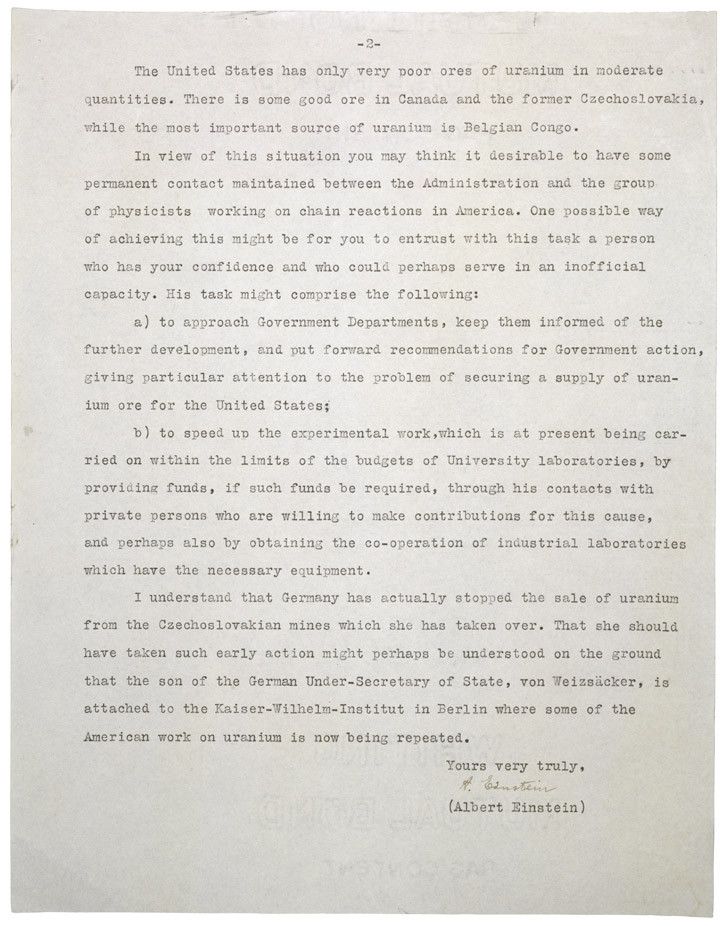10:17:05 pm 07/23/2023
Viewed: 4564
Einstein Wrote an Urgent Letter that Altered History Forever
Picture this: It's August 2, 1939. Albert Einstein, the world-renowned German physicist, is about to write a letter that will forever alter the course of history. This isn't just any letter - it's a message to President Franklin D. Roosevelt that will ignite a series of events leading to the creation of the most devastating weapon known to mankind.
This pivotal moment, recently brought to life in Christopher Nolan's new movie 'Oppenheimer', marks the beginning of the Manhattan Project. This monumental endeavor, spanning three years from 1942 to 1945, culminated in the creation and deployment of atomic bombs.
In his letter, Einstein revealed the potential of setting up a nuclear chain reaction in a large mass of uranium. This process could generate vast amounts of power and create new radium-like elements. More ominously, it could lead to the creation of 'extremely powerful bombs'.
Einstein didn't just share this groundbreaking knowledge; he urged the President to act. He stressed the importance of keeping Government Departments informed of further developments, securing a supply of uranium ore for the U.S., and accelerating experimental work.
Despite being written in August, the letter didn't reach Roosevelt until October. But once it did, the President wasted no time. As Jeffrey Urbin, an education specialist at the Roosevelt Presidential Library and Museum, notes, Roosevelt immediately set a scientific committee to work to explore the potential of atomic power in the war. The project was cryptically named 'tube alloys'.
This is not just a story of scientific discovery, but a testament to the profound impact that a single letter can have on the course of history. It's a reminder of the power of knowledge, the responsibility that comes with it, and the indelible mark it can leave on the world."
This is EInstein's letter:
Albert Einstein
Old Grove Road
Peconic, Long Island
August 2nd, 1939
F.D. Roosevelt
President of the United States
White House
Washington, D.C.
Sir:
Some recent work by E. Fermi and L. Szilard, which has been communicated to me in manuscript, leads me to expect that the element uranium may be turned into a new and important source of energy in the immediate future. Certain aspects of the situation which has arisen seem to call for watchfulness and if necessary, quick action on the part of the Administration. I believe therefore that it is my duty to bring to your attention the following facts and recommendations.
In the course of the last four months it has been made probable through the work of Joliot in France as well as Fermi and Szilard in America--that it may be possible to set up a nuclear chain reaction in a large mass of uranium, by which vast amounts of power and large quantities of new radium-like elements would be generated. Now it appears almost certain that this could be achieved in the immediate future.
This new phenomenon would also lead to the construction of bombs, and it is conceivable--though much less certain--that extremely powerful bombs of this type may thus be constructed. A single bomb of this type, carried by boat and exploded in a port, might very well destroy the whole port together with some of the surrounding territory. However, such bombs might very well prove too heavy for transportation by air.
The United States has only very poor ores of uranium in moderate quantities. There is some good ore in Canada and former Czechoslovakia, while the most important source of uranium is in the Belgian Congo.
In view of this situation you may think it desirable to have some permanent contact maintained between the Administration and the group of physicists working on chain reactions in America. One possible way of achieving this might be for you to entrust the task with a person who has your confidence and who could perhaps serve in an unofficial capacity. His task might comprise the following:
a) to approach Government Departments, keep them informed of the further development, and put forward recommendations for Government action, giving particular attention to the problem of securing a supply of uranium ore for the United States.
b) to speed up the experimental work, which is at present being carried on within the limits of the budgets of University laboratories, by providing funds, if such funds be required, through his contacts with private persons who are willing to make contributions for this cause, and perhaps also by obtaining co-operation of industrial laboratories which have necessary equipment.
I understand that Germany has actually stopped the sale of uranium from the Czechoslovakian mines which she has taken over. That she should have taken such early action might perhaps be understood on the ground that the son of the German Under-Secretary of State, von Weizsacker, is attached to the Kaiser-Wilhelm Institute in Berlin, where some of the American work on uranium is now being repeated.
Yours very truly,
Albert Einstein
Picture this: It's August 2, 1939. Albert Einstein, the world-renowned German physicist, is about to write a letter that will forever alter the course of history. This isn't just any letter - it's a message to President Franklin D. Roosevelt that will ignite a series of events leading to the creation of the most devastating weapon known to mankind.
This pivotal moment, recently brought to life in Christopher Nolan's new movie 'Oppenheimer', marks the beginning of the Manhattan Project. This monumental endeavor, spanning three years from 1942 to 1945, culminated in the creation and deployment of atomic bombs.
In his letter, Einstein revealed the potential of setting up a nuclear chain reaction in a large mass of uranium. This process could generate vast amounts of power and create new radium-like elements. More ominously, it could lead to the creation of 'extremely powerful bombs'.
Einstein didn't just share this groundbreaking knowledge; he urged the President to act. He stressed the importance of keeping Government Departments informed of further developments, securing a supply of uranium ore for the U.S., and accelerating experimental work.
Despite being written in August, the letter didn't reach Roosevelt until October. But once it did, the President wasted no time. As Jeffrey Urbin, an education specialist at the Roosevelt Presidential Library and Museum, notes, Roosevelt immediately set a scientific committee to work to explore the potential of atomic power in the war. The project was cryptically named 'tube alloys'.
This is not just a story of scientific discovery, but a testament to the profound impact that a single letter can have on the course of history. It's a reminder of the power of knowledge, the responsibility that comes with it, and the indelible mark it can leave on the world."
This is EInstein's letter:
Albert Einstein
Old Grove Road
Peconic, Long Island
August 2nd, 1939
F.D. Roosevelt
President of the United States
White House
Washington, D.C.
Sir:
Some recent work by E. Fermi and L. Szilard, which has been communicated to me in manuscript, leads me to expect that the element uranium may be turned into a new and important source of energy in the immediate future. Certain aspects of the situation which has arisen seem to call for watchfulness and if necessary, quick action on the part of the Administration. I believe therefore that it is my duty to bring to your attention the following facts and recommendations.
In the course of the last four months it has been made probable through the work of Joliot in France as well as Fermi and Szilard in America--that it may be possible to set up a nuclear chain reaction in a large mass of uranium, by which vast amounts of power and large quantities of new radium-like elements would be generated. Now it appears almost certain that this could be achieved in the immediate future.
This new phenomenon would also lead to the construction of bombs, and it is conceivable--though much less certain--that extremely powerful bombs of this type may thus be constructed. A single bomb of this type, carried by boat and exploded in a port, might very well destroy the whole port together with some of the surrounding territory. However, such bombs might very well prove too heavy for transportation by air.
The United States has only very poor ores of uranium in moderate quantities. There is some good ore in Canada and former Czechoslovakia, while the most important source of uranium is in the Belgian Congo.
In view of this situation you may think it desirable to have some permanent contact maintained between the Administration and the group of physicists working on chain reactions in America. One possible way of achieving this might be for you to entrust the task with a person who has your confidence and who could perhaps serve in an unofficial capacity. His task might comprise the following:
a) to approach Government Departments, keep them informed of the further development, and put forward recommendations for Government action, giving particular attention to the problem of securing a supply of uranium ore for the United States.
b) to speed up the experimental work, which is at present being carried on within the limits of the budgets of University laboratories, by providing funds, if such funds be required, through his contacts with private persons who are willing to make contributions for this cause, and perhaps also by obtaining co-operation of industrial laboratories which have necessary equipment.
I understand that Germany has actually stopped the sale of uranium from the Czechoslovakian mines which she has taken over. That she should have taken such early action might perhaps be understood on the ground that the son of the German Under-Secretary of State, von Weizsacker, is attached to the Kaiser-Wilhelm Institute in Berlin, where some of the American work on uranium is now being repeated.
Yours very truly,
Albert Einstein
No video exists.






Comments